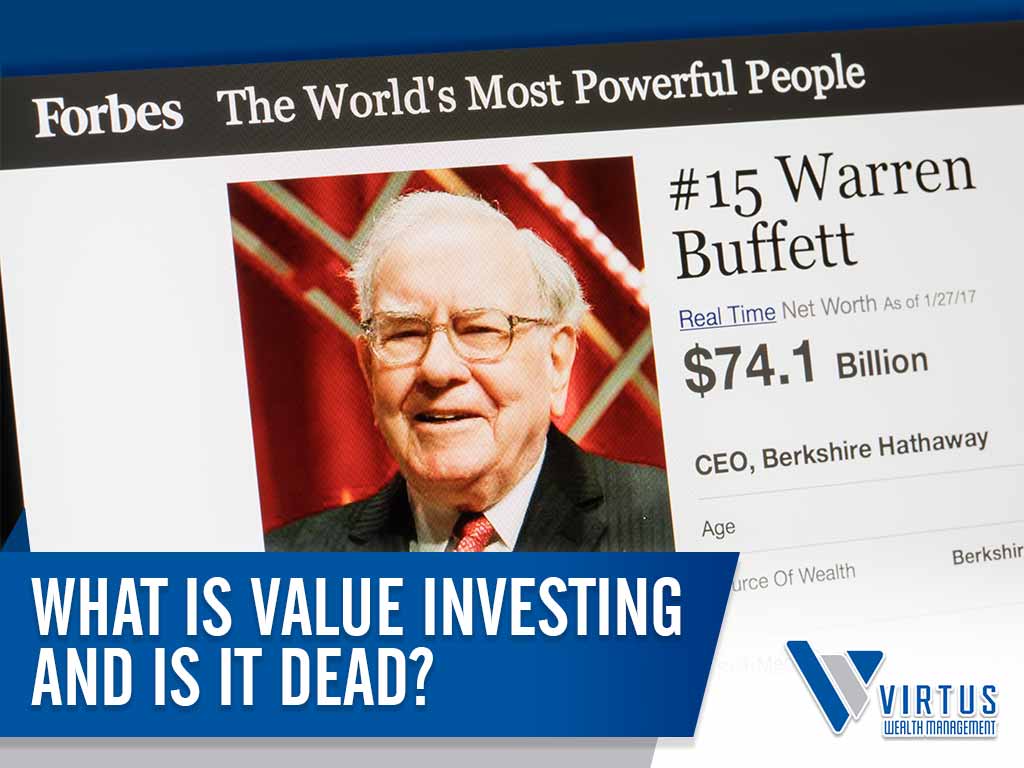I am sharing with you some of the information the Life Insurance Marketing and Research...


There are several items I do not like buying on the cheap, including but not limited to sushi, shoes, toilet paper, and deodorant.
When buying those items on discount, I often recall the old adage in investing that cheap is cheap for a reason. It is a great quote that I often repeat for friends and clients who call me asking if they should buy a company that is in the news because it could enter into bankruptcy. Why do I bring this up? Because cheap isn’t necessarily value. In this article we are going to discuss Value vs Growth investing, which are the are two main categories on investing strategies.
Value investing is really short for investing based on intrinsic value, which is using financial analysis of the company and industry, as well as economic forecasts, to determine expected future cash flows that will be produced by that company. Bottom line, if you were to buy a business outside of the stock market, would you not want to ensure that the earnings from said company would be greater than the money you invested? That is the premise of value investing. I pay a $1 per share today expecting more than a $1 per share back in earnings.
Unfortunately, many, even in the media, make the mistake of equating cheap with value investing. They are not one in the same. An expensive company can still have intrinsic value worth investing in just like some cheap companies have no intrinsic value for investors no matter how cheap it gets. Please don’t mistake value with cheap. More on value investing later.
Growth investing is really completely different. Growth investing is investing in companies in which their earnings growth exceeds those within their industry. You may or may not be investing in a company that has any intrinsic value worth investing in. As long as earnings of that company are exceeding the industry then growth investors are interested.
Bottom line, the price you actually pay for a stock matters much more in value investing versus growth.
Growth stocks have outperformed value stocks for several years in a row now and for the past decade. Maybe you heard but arguably the greatest investor in the world, Warren Buffett, has forgotten everything he has ever known because his fund has under performed growth stocks now over the last decade, as well as had his worst year ever in 2019.
Or maybe he hasn’t forgot how to invest? Let’s review in more detail. Historically, growth stocks are more volatile and have bigger swings than value stocks. * However, if you go back throughout history, value stocks have out-performed growth stocks. In an article by Dimension Funds Advisors titled “Value Judgments: Viewing the Premium’s Performance Through History’s Lens,”they point out that value stocks have actually performed basically at their historical average (since June, 1926) over the past decade, 12.9% vs 12.7%, while growth stocks have significantly out-performed their average, 16.3% versus 9.7%. Do you believe history repeats itself in the markets? Can this out-performance go on forever? What happens if we do see a reversion to the mean? As I have said many times, I agree with Sir John Templeton that the four worst words in investing are “this time is different.” Considering I do believe we revert back to the mean in the investment world, I wouldn’t chase growth stocks because of their recent returns or give up on value stocks for the same reason.
It is important to note that there are reasons growth stocks have outperformed lately. Lower interest rates typically help growth stocks more. The question is if it is too much?Are we close to a bubble? Can these valuations continue?
There are some important conclusions here. First, diversification matters. Having both value and growth stocks is a wise move for more moderate and conservative investors. Second, don’t chase. This is very hard to do when someone looks at the options and sees bonds paying little in interest, many good dividend paying stocks doing very little, while a handful of hot names keeping running higher and higher. The bad thing about volatility is it cuts both ways. Downside volatility can be just as swift but much more painful.
Investing really is the same today as it was 80 years ago, we just have more tools. Value stocks will have their day in the sun again. It is hard to argue against the concept of buying something today while expecting a real return (more earnings/dividends) in the future. That concept hasn’t died, nor has value investing.
*2 schools of investing: growth vs. value, Fidelity
Content in this material is for general information only and not intended to provide specific advice or recommendations for any individual.
All performance referenced is historical and is no guarantee of future results.
The investment strategies mentioned may not be suitable for everyone.
All investing involves risk including loss of principal.
No strategy assures success or protects against loss.
Past performance is no guarantee of future results.
There is no guarantee that a diversified portfolio will enhance overall returns or outperform a non-diversified portfolio.
Diversification does not protect against market risk.